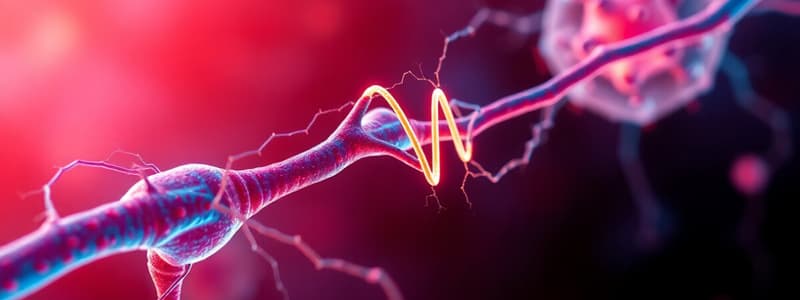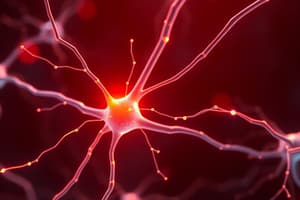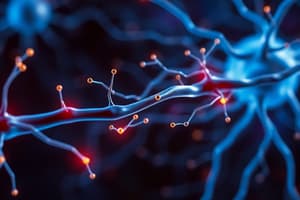Podcast
Questions and Answers
How does the intensity of a stimulus affect nerve impulses?
How does the intensity of a stimulus affect nerve impulses?
A strong stimulus produces more nerve impulses in a given time compared to a weak stimulus.
What role do calcium ions play when a nerve impulse reaches the axon terminal?
What role do calcium ions play when a nerve impulse reaches the axon terminal?
Calcium ions flow into the pre-synaptic axon terminal, activating neurotransmitter release.
What happens to synaptic vesicles when calcium ions enter the axon terminal?
What happens to synaptic vesicles when calcium ions enter the axon terminal?
Synaptic vesicles fuse with the membrane, releasing neurotransmitters through exocytosis.
How do neurotransmitters affect the next neuron in the synaptic transmission process?
How do neurotransmitters affect the next neuron in the synaptic transmission process?
Explain the significance of neurotransmitter receptors in synaptic communication.
Explain the significance of neurotransmitter receptors in synaptic communication.
Identify a key factor that influences the release of neurotransmitters from axon terminals.
Identify a key factor that influences the release of neurotransmitters from axon terminals.
What is the process called by which neurotransmitters are released into the synaptic cleft?
What is the process called by which neurotransmitters are released into the synaptic cleft?
Discuss how the axon terminal's role is essential in neurotransmission.
Discuss how the axon terminal's role is essential in neurotransmission.
How does the hormone-receptor complex influence gene expression in adaptive traits?
How does the hormone-receptor complex influence gene expression in adaptive traits?
What is heterozygote advantage and how can it relate to hormone action in natural selection?
What is heterozygote advantage and how can it relate to hormone action in natural selection?
In what way does natural selection impact the formation of proteins through gene activation?
In what way does natural selection impact the formation of proteins through gene activation?
How can dysfunction in hormone-receptor complexes lead to genetic disorders in humans?
How can dysfunction in hormone-receptor complexes lead to genetic disorders in humans?
Explain the connection between evolutionary theory and the role of gene regulation by hormone-receptor complexes.
Explain the connection between evolutionary theory and the role of gene regulation by hormone-receptor complexes.
What role do gene promoters play in the context of adaptive traits and hormonal influence?
What role do gene promoters play in the context of adaptive traits and hormonal influence?
How is gene activation through hormone-receptor complexes essential in understanding human genetic disorders?
How is gene activation through hormone-receptor complexes essential in understanding human genetic disorders?
Can you describe how the hormone-receptor complex might affect evolutionary advantages in a population?
Can you describe how the hormone-receptor complex might affect evolutionary advantages in a population?
What process allows a hormone to trigger an amplification effect in the body?
What process allows a hormone to trigger an amplification effect in the body?
What happens to hormones after they have produced their required effect?
What happens to hormones after they have produced their required effect?
Explain how the body maintains homeostasis in relation to hormone levels.
Explain how the body maintains homeostasis in relation to hormone levels.
What is the role of negative feedback in hormone secretion?
What is the role of negative feedback in hormone secretion?
How are the secretions of the pituitary gland controlled?
How are the secretions of the pituitary gland controlled?
Where are most hormones broken down in the body?
Where are most hormones broken down in the body?
What could be the consequence of abnormal hormone secretion?
What could be the consequence of abnormal hormone secretion?
What is an example of a physiological process regulated by hormones?
What is an example of a physiological process regulated by hormones?
What are the primary organs involved in the clearance of most hormones?
What are the primary organs involved in the clearance of most hormones?
How does enzyme amplification impact hormonal signaling?
How does enzyme amplification impact hormonal signaling?
Flashcards are hidden until you start studying
Study Notes
Nerve Impulse Transmission
- A strong stimulus generates more nerve impulses within a set timeframe than a weak stimulus.
Transmission Across a Synapse
- When the nerve impulse reaches the axon terminal, it activates voltage-gated calcium ion channels.
- Calcium ions flow into the presynaptic axon terminal due to a higher concentration of calcium in the extracellular fluid.
- This influx of calcium causes synaptic vesicles to fuse with the membrane, releasing neurotransmitters by exocytosis.
- Neurotransmitters diffuse across the synaptic gap and attach to receptors on the membrane of the next neuron.
- The hormone-receptor complex activates genes that control the formation of specific proteins. This happens through binding to the promoter section of a specific gene.
Enzyme Amplification
- Hormones trigger a cascading effect, amplifying the number of reacting molecules hundreds or thousands of times.
Hormone Clearance
- Once a hormone has exerted its intended effect, it needs to be deactivated.
- This is achieved by breaking down the hormone molecule.
- Some hormones are broken down within the target cells.
- Most hormones are broken down in the liver and kidneys.
- The degraded hormones are then excreted in the bile or urine.
Control of Hormone Secretions
- To maintain homeostasis, the amount of hormone secreted must be closely regulated.
- Oversupply or undersupply of a hormone can cause the body to function abnormally.
- Hormones are regulated through negative feedback mechanisms.
- The response to the stimulus is opposite.
- For example, in osmoregulation, the secretions of the pituitary gland are controlled by the hypothalamus through hormone transport via nerve cells or via the vascular link between them.
- The pituitary gland is connected to the hypothalamus through an infundibulum.
- The hypothalamus and the posterior pituitary gland are connected by nerve fibres that transport hormones.
Studying That Suits You
Use AI to generate personalized quizzes and flashcards to suit your learning preferences.




